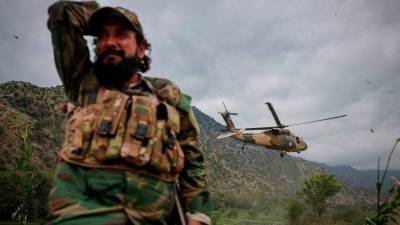KABUL: Afghanistan airdropped commandos on Wednesday to extract survivors from collapsed homes in remote mountainous regions devastated by recent earthquakes.
The disaster has claimed 1,400 lives and prompted a massive escalation of relief operations delivering food, shelter and medical supplies.
A magnitude 6.0 earthquake struck Kunar and Nangarhar provinces around midnight Sunday at a shallow depth of ten kilometres.
This initial tremor caused widespread destruction across eastern Afghanistan and ranks among the country’s worst seismic events in recent years.
A subsequent magnitude 5.5 quake on Tuesday triggered landslides that blocked access roads and forced temporary suspension of rescue activities.
Dozens of special forces personnel are being deployed to inaccessible locations where helicopters cannot safely land.
Kunar disaster management head Ehsanullah Ehsan confirmed the establishment of coordination camps overseeing supply distribution and emergency assistance.
Two dedicated centres now manage casualty transfers, burial procedures and survivor extraction operations.
Rescuers initially employed helicopters for medical evacuations despite challenging terrain and adverse weather conditions along the Pakistan border.
The official casualty count stands at 1,411 fatalities with 3,124 injuries and over 5,400 homes completely destroyed.
United Nations officials have warned these numbers will likely increase as victims remain trapped beneath debris.
A Reuters correspondent witnessed comprehensive devastation with every structure damaged and desperate digging through rubble.
Residents reported the second quake demolished homes that had only been partially damaged during the initial seismic event.
This impoverished nation of 42 million people faces severe resource constraints in its disaster response efforts.
International assistance has been limited since the Taliban administration assumed control of the country.
The United Nations Office for the Coordination of Humanitarian Affairs noted unstable ground conditions from heavy rainfall exacerbated the destruction.
Flimsy construction materials including dry masonry and timber provided inadequate protection against the tremors.
OCHA has issued urgent appeals for emergency shelter, food aid and sanitation facilities alongside drinking water and medical supplies.
Médecins Sans Frontières distributed trauma kits to overwhelmed hospitals already operating at full capacity before the disaster.
Deputy medical coordinator Dr Fazal Hadi observed patients receiving treatment in corridors and healthcare workers requiring additional resources.
The humanitarian response must rapidly expand to address this catastrophic situation in earthquake-prone regions.
Afghanistan’s location along the Hindu Kush mountain range makes it particularly vulnerable to seismic activity.
This geological instability stems from the collision point between Indian and Eurasian tectonic plates. – Reuters
